It’s Eclipse Party Time!
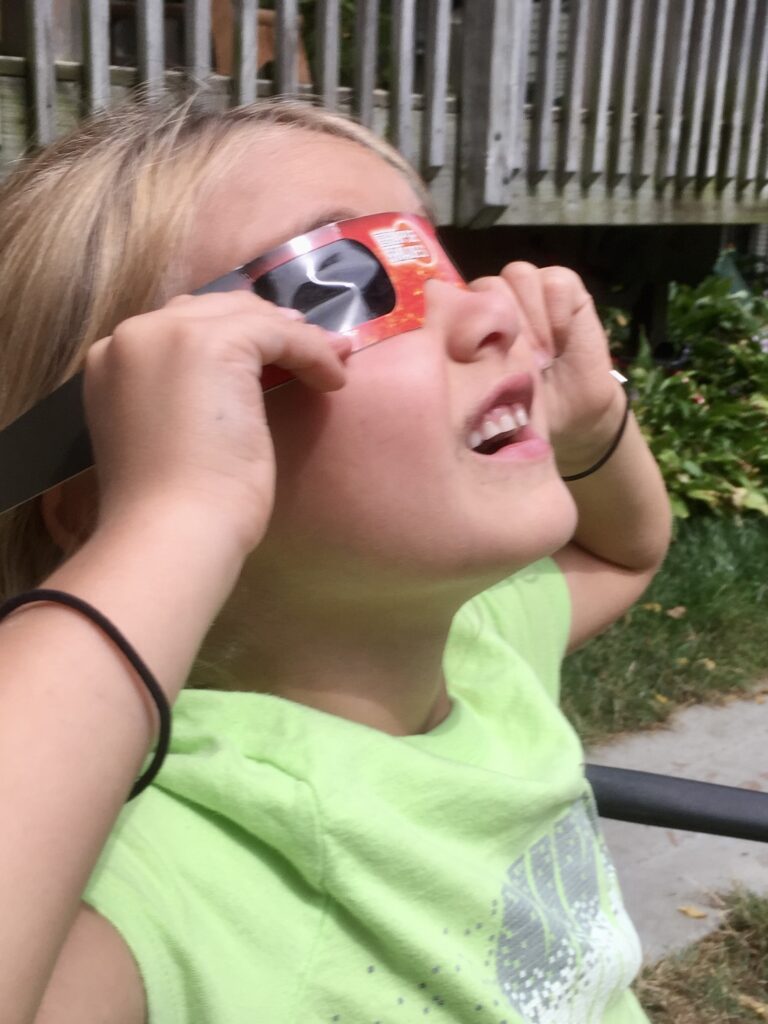
“The dogs are barking so much . . . I think they are scared,” says Vera as she looks up at the sky with her certified safe eclipse glasses pressed against her eyes. She is absolutely right! The dogs in the neighborhood, the singing birds in the trees and the chirping crickets are louder and more intense than usual as the moon slowly creeps into the path between the sun and the earth. They must sense that something out of the ordinary is about to take place!
Back on August 21, 2017, we had a lot of fun with a spectacular total eclipse in our own outdoor classroom. As fans of science and childhood, do you have anything special planned for the two solar eclipses that will be taking place in October 2023 and April 2024?
Who needs a laminated poster of the planets when we can watch the real solar system in motion? A solar eclipse happens when the moon travels between the earth and the sun and causes a shadow to fall on certain parts of the earth. It’s a rare and wonderful learning opportunity for your early STEM explorers!
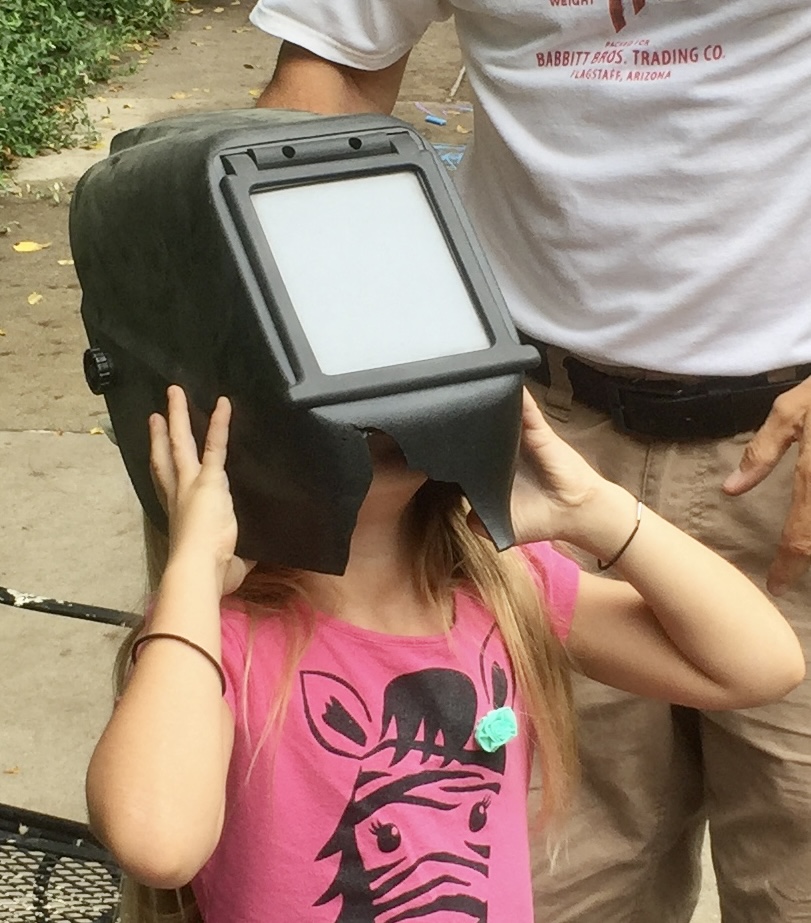
Here in Illinois, we will be lucky enough to experience an “eclipse preview” on October 14, 2023, when an annular solar eclipse will take place prior to the next total eclipse on April 8, 2024. I’m giddy with excitement at the prospect of this STEM extravaganza!
So what exactly is an annular solar eclipse? This type of eclipse occurs when the moon appears slightly smaller in the sky than the sun and cannot fully block the sun’s rays. During an annular eclipse, you will see a bright ring around the edges of the moon.
Fortunately (for those of us who are teachers), this first eclipse happens on a Saturday! We won’t have to deal with parents and other adults worrying about whether or not it will be safe for their children to observe the eclipse—and we won’t be so worried about our students keeping their glasses on that we don’t get to enjoy the eclipse ourselves.
On the Friday before the annular eclipse, however, you can introduce your early learners to a little “solar eclipse science.” Add some Oreo cookies to their Friday afternoon snacks (you’ll find out why a little later in this post) and initiate a discussion about “What will happen on Saturday, when we have sunshine and a bit of darkness in the afternoon.” Then send the children home for the weekend to share the experience with their parents.
Before you dive into the science behind this sky show, however, keep in mind that people in certain cultures consider the eclipse to be a bad omen. In these cultures, an eclipse is not an exciting event to be studied, but something to be avoided. People in these cultures stay indoors and abstain from food and drink until the eclipse is over. In our multicultural society, it makes sense to be proactive. Discuss your eclipse lesson and activities with your program administrators and check in with the families in your early childhood community. Be aware of any cultural considerations that you may need to take into account.
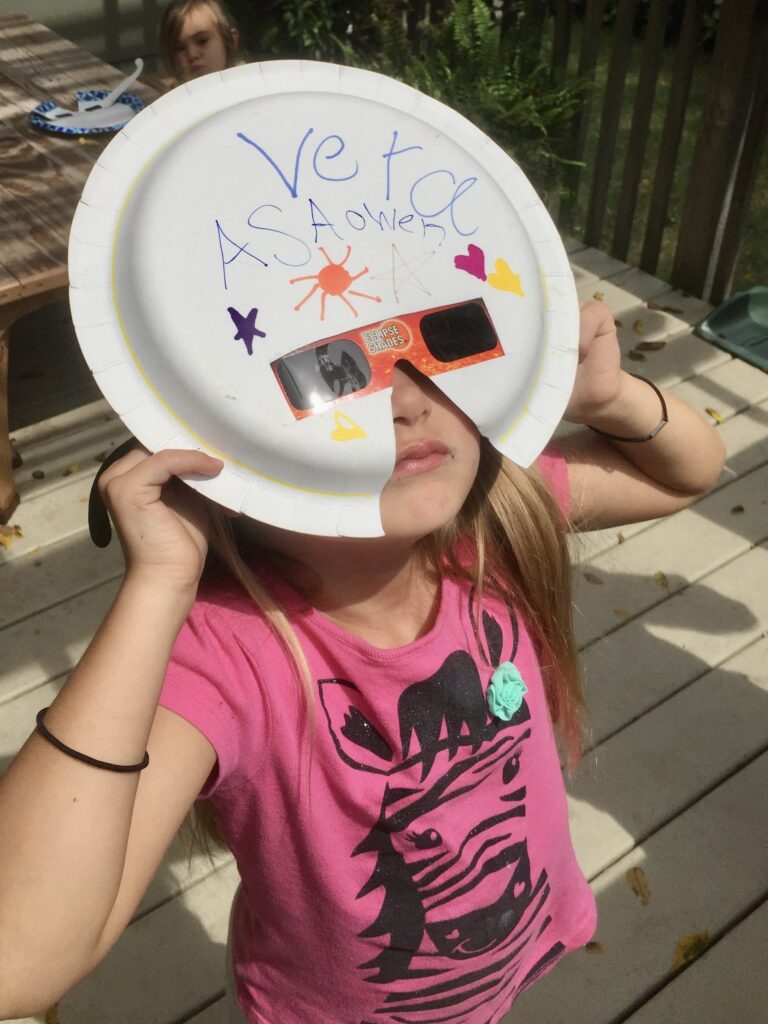
“Listen!” Vera whispers softly, “The dogs aren’t barking anymore. It’s really quiet now. I bet the animals think it’s nighttime . . . and it seems colder.”
In our Early Science Matters blog posts, we often remind readers that young children learn best by using their senses. Vera’s comment reminds me how naturally information flows through the senses to a child’s developing brain. When you’re a child—or an adult, for that matter—there’s nothing quite like the moment when a sunny day goes dark. The birds, animals and insects suddenly go silent while the sun’s corona shines in the sky.
Back in 2017, we planned our eclipse party ahead of time. Our local library was giving away safety glasses. We made them a bit safer and easier for little hands to handle by attaching the glasses to paper plates. Some of the parents in our program at the time also shared their welding masks with the children. The welding masks were a big hit—and they were easy for the children to hold over their faces.
According to NASA, it’s safe to view a solar eclipse as long as observers are using a #12 welding filter or higher. But many eclipse viewers find the solar image to be uncomfortably bright when viewed through a #12 filter. For that reason, #13 and #14 filters are becoming more popular with eclipse viewers (although some viewers find the solar image to be a bit too dim when viewing it through a #14 or darker welding filter).
Google “homemade eclipse viewing devices” and you’ll find instructions for making “do-it-yourself eclipse eyewear” from materials such as mailing tubes, paper plates, aluminum foil and cereal boxes. Just remember to keep it simple and age-appropriate!
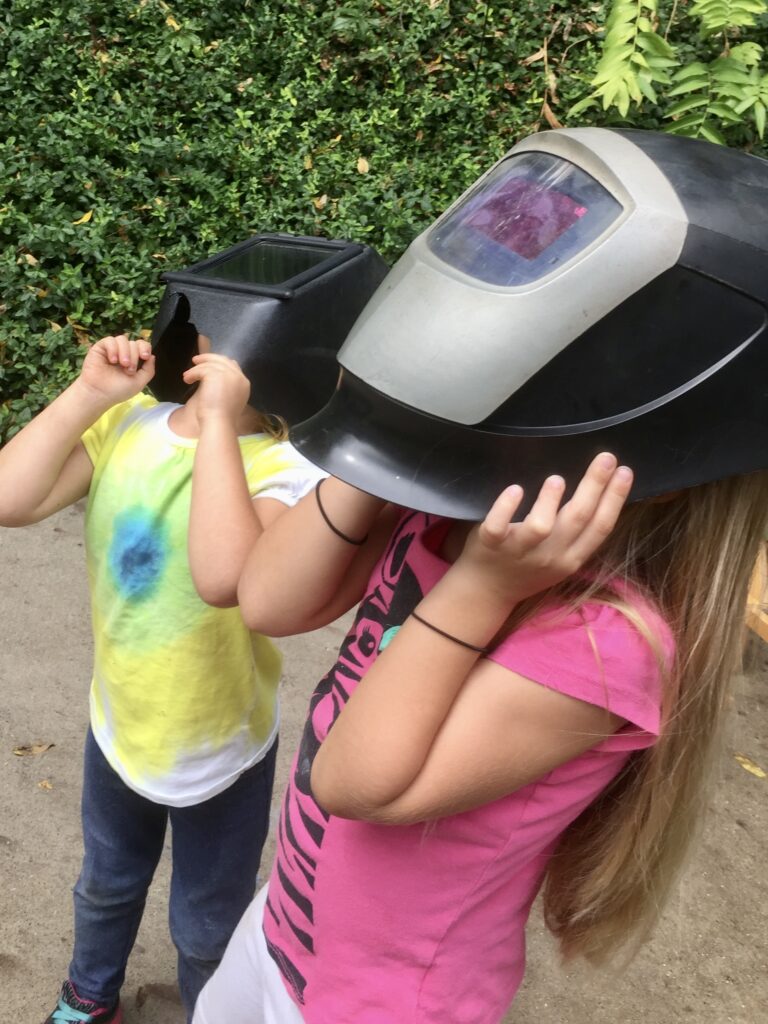
We also served Oreo cookies at our eclipse party and used the cookies to represent the different phases of the eclipse. Everything is more fun with an Oreo cookie in your hand!
You can also find some great Oreo moon phase downloads online if you’re interested in continuing your lunar investigations as the days get shorter and the moon becomes visible earlier.
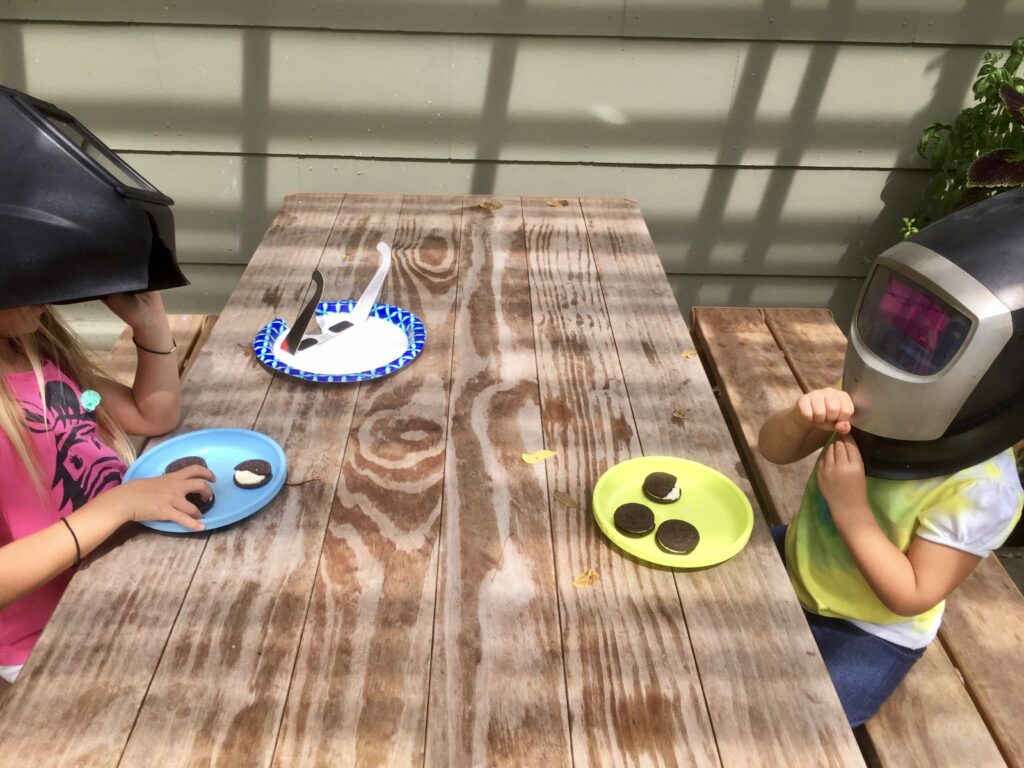
The annular solar eclipse on October 14 will be a great primer for the upcoming total eclipse on Monday, April 8, 2024, between 1:58 p.m. and 2:06 p.m. Central Daylight Time.
Consider inviting parents to participate in an eclipse viewing party. A total eclipse of the sun is one of the most beautiful sights to see in the sky. No photograph can capture the beauty and stillness of a total eclipse. It will truly awaken a sense of wonder in every budding STEM explorer!
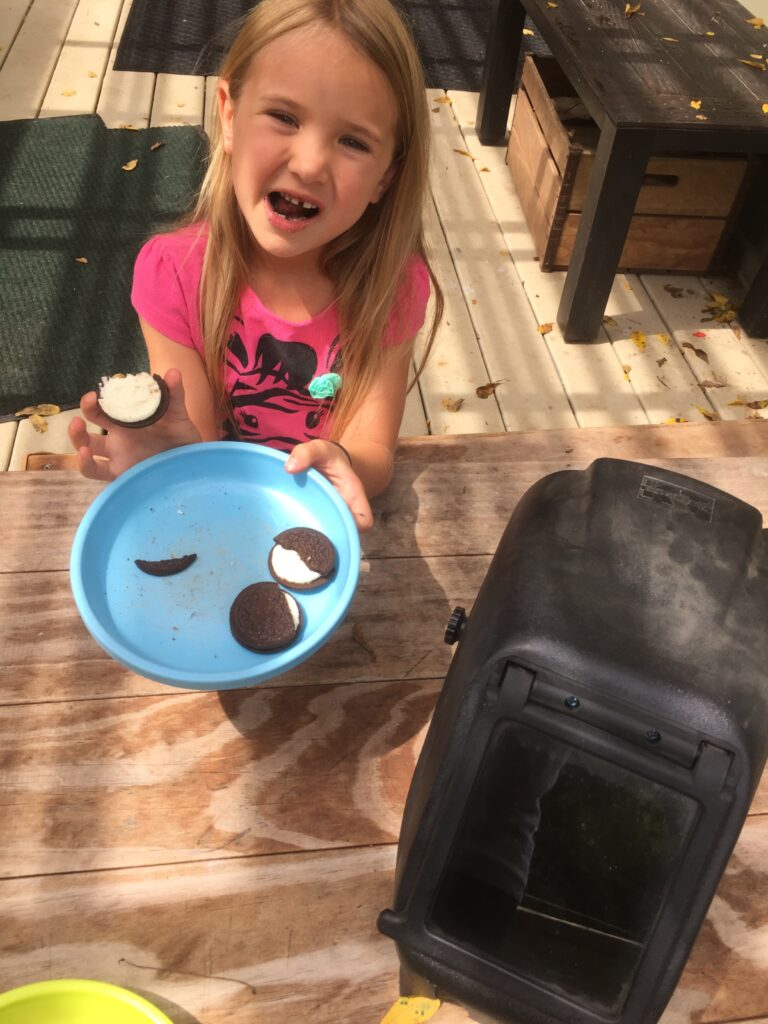
If you already have a good eclipse viewing plan in place, please share it with the Early Science Matters community in our COMMENTS section!
fun in the sun
I love this and watching an eclipse with children sounds so fun
I love this!
i love this a good project for kids
You could also set up a party to observe different phases of the moon. Great blog!!!
Lamont Jackson
I love this
Very good
What is happening with the moon and the sun? How does the moon block the sun?
When the moon blocks the sun, what happens? What can you see/feel?
Extend the lesson by modeling what happens before the actual eclipse takes place using balls and flashlight/lamp.
Thank you for the reminder of cultural implications. That is not something I would have had on my radar for a natural event such as an eclipse! I appreciate the information and will be sure to be aware.
Thank you
Thanks for the information and the lessons ideas. I have talked about the phases of the moon and the oreo idea sounds like a great way to engage the children in a fun and memorable way.